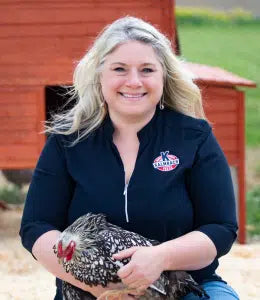What is Henopause, and How Does it Affect Egg Production?

Have you noticed your older hens taking more breaks between laying eggs? You're not alone! Just like many backyard chicken keepers, you might be wondering why your faithful layers seem to be slowing down. Let's talk about henopause - yes, that's a real thing - and what it means for you and your flock.
What Does Henopause Mean?
Here's something interesting: just like humans, chickens go through age-related changes that affect their egg-laying. We call this "henopause," and while it might sound funny, understanding it helps you know what to expect as your feathered friends get older. Think of it this way - egg laying is all about reproduction, and just like any female animal, your hen's reproductive abilities naturally change with age.
If you've spent any time watching your flock, you know that laying an egg takes a lot of energy. Your hens need to create not just the yolk and white but also that amazing shell that keeps everything safe. As they age, this process naturally becomes more demanding for their bodies. Understanding this helps explain why older hens might need more time between laying eggs - they're not being lazy; they're just taking care of themselves!
What age is considered "older" for chickens?
Would you believe that the world's oldest chicken lived to be 23 years and 152 days old? (Muffy made it into the Guinness Book of World Records!) While that's amazing, most backyard chickens live to be about 8 years old. In the chicken world, your hens are considered "older" around age 3. Don't worry - this doesn't mean they stop laying eggs completely. It means they're no longer spring chickens, and you might notice some changes in their laying patterns.
How does Henopause affect egg production?
When your hens reach their golden years, you'll start to notice some natural changes. They might take longer breaks between laying eggs, and their annual molt may last a bit longer than it used to. This isn't because you're doing anything wrong with their care - it's just part of their natural aging process.
Want to give your older girls some extra support during these changes? Our Henhouse Reserve® Supplement Block is perfect for hens 14 weeks and older. It's a delicious supplement that won't disintegrate in nasty weather, and it's packed with whole grains your chickens will love. Plus, it includes our special LifeGuard® blend of prebiotics, probiotics, essential oils, and enzymes to support their digestive and immune health during these natural breaks. We've even added YolkProud™, our all-natural ingredient mix that helps promote those beautiful, vibrant yolks everyone loves to see in their breakfast eggs.
Do Chickens Stop Laying Eggs At a Certain Age?
Here's some good news: your hens don't actually run out of eggs! When a female chick hatches, she already has tens of thousands of tiny ova (the beginnings of eggs) in her body. Even if she laid an egg every single day for 10+ years, she'd still have plenty left. What changes isn't the number of potential eggs but how efficiently her body can produce them.
If you've ever worried about your older hen "running out" of eggs, you're not alone - it's one of the most common questions we hear from backyard flock owners. The truth is pretty amazing: your hen is born with more potential eggs than she could ever lay in her lifetime. Instead of thinking about eggs "running out," think of it more like your hen's body gradually slowing down its egg-making process. Just like humans need more rest as they age, older hens need more time between laying eggs to maintain their health and energy levels.
Egg Production Expectations in Older Hens
Want to know what to expect as your hens age? Here's a friendly breakdown:
- Peak laying years are from about 8 months to 2 years old, when you can expect around 9-10 eggs from every 10 hens daily
- At age 2, you might see a slight dip to 8-9 eggs from those same 10 hens
- By age 3, expect about 6 eggs daily from your group of 10
- Around age 4, this might drop to 4 eggs daily
- At 5+ years, you might get 2-3 eggs daily from your senior flock
But don't be surprised if your older girls still surprise you with occasional eggs - many chicken keepers tell us they get eggs from hens over 10 years old!
Speaking of keeping your senior hens happy and productive, have you tried our Henhouse Reserve Feed for Chickens? We've specially crafted this blend with whole grains and vegetables to support your flock through their golden years. It's fully fortified with vitamins, minerals, and amino acids to help your hens produce strong shells and wholesome, tasty eggs. Like all our premium feeds, it contains our LifeGuard® blend for digestive and immune health, plus YolkProud™ for those beautiful, bright yolks everyone loves.
H2: Explore Chicken Feed Options from Kalmbach Feeds
We're here to help you keep your flock healthy and happy at every age. Whether you have young layers or senior hens, we've got the right nutrition to support them. Have questions about feeding your older girls? Contact us; we'd love to help!
